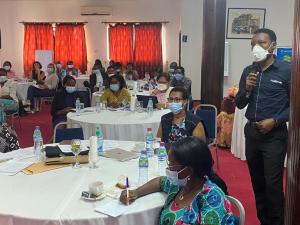Sierra Leone initiates adaptation of WHO Guidelines on Self-Care for Health
Sierra Leone convened its first consultative meeting to initiate discussions on adaptation and introduction of the WHO Consolidated Guideline on Self-care Interventions for Sexual and Reproductive Health with key reproductive and child health stakeholders and Partners on 21 January.
Self-care is an innovative strategy developed by the World Health Organization and refers to the ability of individuals, families and communities to promote health, prevent disease, maintain health, and to cope with illness and disability with or without the support of a health worker. Self-care interventions have huge benefits for the individual and community, as well as for the health system as it empowers individuals, families and communities to take responsibility in looking after their own health.
This first meeting in Freetown brought together strategic partners in the health sector with the aim to orientate them on Self-care interventions for health, and identify the immediate priorities that would facilitate development and validation of national guidelines and tools to implement Self-care interventions in Sierra Leone.
The timing for the commencement of the consultations is perfect, because Sierra Leone is already planning for the introduction of HIV self-testing targeting key vulnerable populations and discordant couples an initiative that was launched in December 2020. A consignment of HIV self-testing kits is already available in-country to kick start the intervention.
Once developed, the National Self-care strategies for Sierra Leone will help to guide and ensure coordinated implementation and monitoring of all self-care interventions, including interventions such as HIV self-testing, which is already planned and selected reproductive health services, among others.
In 2014, the Global Atlas of the Health Workforce reported that 14,000 more health workers are required in Sierra Leone to meet the WHO minimum standard of skilled health workers per 10,000 population. Hence, introduction of the Self-care interventions will create more opportunities for individuals to make informed decisions regarding their health and health care and increase choice. Successful implementation of the interventions will also help to improve access and reduced health disparities.
The dissemination and adaptation of the WHO Sexual Reproductive Health and Rights Self-care guidelines is supported through the WHO Regional Office for Africa and Swedish Collaboration
The WHO Self-care recommendations are directly linked to the Sustainable Development Goals of the United Nations and the WHO Strategic Priorities and triple billion goals which aim to advance universal health coverage and protection against health emergencies and healthier populations.



